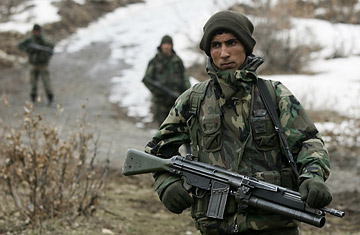
Turkish commandos patrol a road near the Turkey-Iraq border in the mainly Kurdish southeastern province of Sirnak.
In the face of mounting pressure from the American and Iraqi governments, a Turkish envoy in Baghdad said on Wednesday that Turkey would continue military operations in northern Iraq until it was satisfied it had destroyed the bases of Kurdish guerillas. "Our objective is clear, our mission is clear and there is no timetable," said Ahmet Davutoglu, an adviser to the Turkish prime minister, at a Baghdad news conference. He was in Iraq for meetings with American and Iraqi officials, including the Iraqi foreign minister and U.S. commander David Petraeus.
The Turkish government seemed unmoved by the Iraqi cabinet's statement on Tuesday condemning Turkey's incursion as a "violation of Iraqi sovereignty" and a "unilateral military action." The Turkish military sent ground troops into northern Iraq last Thursday to take on guerrillas of the Kurdistan Workers' Party (PKK).
Baghdad has said repeatedly that it cannot control PKK rebels, and therefore cannot be held responsible for their cross-border raids into Turkey. But that admission of weakness means that the Turks are unlikely to take Iraq seriously as an independent state that might take aggressive steps to defend its sovereignty — a situation that may have serious consequences in the near future when critical and petroleum-rich areas like Kirkuk may come increasingly under the sway of Iraq's regional Kurdish government.
A similar drama played out in December, when the Turkish government responded to PKK attacks with a series of air strikes in northern Iraq. But the scale of this month's fighting, along with Turkey's use of significant ground forces, has provoked a more serious crisis. Several thousand Turkish troops have entered several miles into northern Iraq, and with reinforcements moving south through Turkey the operation does not seem to be winding down. According the Turkish military's website 24 of its soldiers and 230 PKK guerrillas have been killed since the operation began.
The only pressure that may work to end or limit Turkey's operations in northern Iraq will have to come from U.S. Secretary of Defense, Robert Gates, who arrived Wednesday in Turkey for talks. His visit had been planned before the latest fighting, but before leaving India for Turkey, Gates indicated that diffusing the crisis in Kurdistan was now at the top of his agenda. He told reporters that "it's very important that the Turks make this operation as short as possible and then leave. They have to be mindful of Iraqi sovereignty." And, putting a U.S. timetable on Turkish operations for the first time, Gates said, "I measure quick in terms of days, a week or two, something like that, not months."
If Turkey does pull back, it would represent a victory for Iraq's stability. However, it would also underline the extent to which the United States — not the Iraqi government — remains the arbiter of Iraq's affairs.
